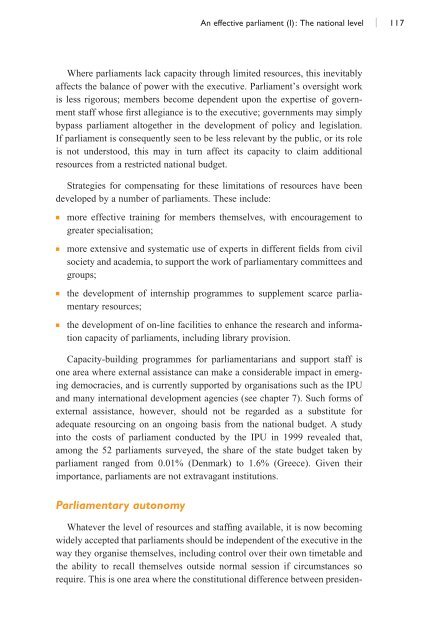PARLIAMENT AND DEMOCRACY - Inter-Parliamentary Union
PARLIAMENT AND DEMOCRACY - Inter-Parliamentary Union
PARLIAMENT AND DEMOCRACY - Inter-Parliamentary Union
Create successful ePaper yourself
Turn your PDF publications into a flip-book with our unique Google optimized e-Paper software.
Where parliaments lack capacity through limited resources, this inevitably<br />
affects the balance of power with the executive. Parliament’s oversight work<br />
is less rigorous; members become dependent upon the expertise of government<br />
staff whose first allegiance is to the executive; governments may simply<br />
bypass parliament altogether in the development of policy and legislation.<br />
If parliament is consequently seen to be less relevant by the public, or its role<br />
is not understood, this may in turn affect its capacity to claim additional<br />
resources from a restricted national budget.<br />
Strategies for compensating for these limitations of resources have been<br />
developed by a number of parliaments. These include:<br />
■ more effective training for members themselves, with encouragement to<br />
greater specialisation;<br />
■ more extensive and systematic use of experts in different fields from civil<br />
society and academia, to support the work of parliamentary committees and<br />
groups;<br />
■ the development of internship programmes to supplement scarce parliamentary<br />
resources;<br />
■ the development of on-line facilities to enhance the research and information<br />
capacity of parliaments, including library provision.<br />
Capacity-building programmes for parliamentarians and support staff is<br />
one area where external assistance can make a considerable impact in emerging<br />
democracies, and is currently supported by organisations such as the IPU<br />
and many international development agencies (see chapter 7). Such forms of<br />
external assistance, however, should not be regarded as a substitute for<br />
adequate resourcing on an ongoing basis from the national budget. A study<br />
into the costs of parliament conducted by the IPU in 1999 revealed that,<br />
among the 52 parliaments surveyed, the share of the state budget taken by<br />
parliament ranged from 0.01% (Denmark) to 1.6% (Greece). Given their<br />
importance, parliaments are not extravagant institutions.<br />
<strong>Parliamentary</strong> autonomy<br />
An effective parliament (I): The national level I 117<br />
Whatever the level of resources and staffing available, it is now becoming<br />
widely accepted that parliaments should be independent of the executive in the<br />
way they organise themselves, including control over their own timetable and<br />
the ability to recall themselves outside normal session if circumstances so<br />
require. This is one area where the constitutional difference between presiden-

















